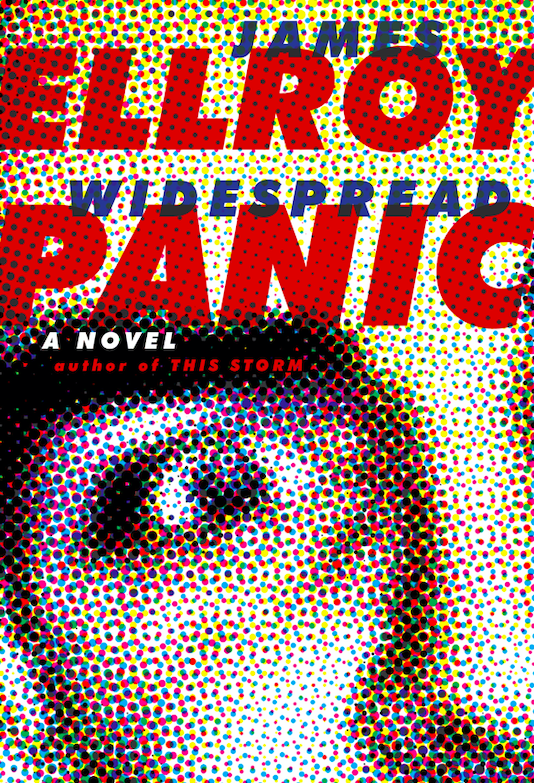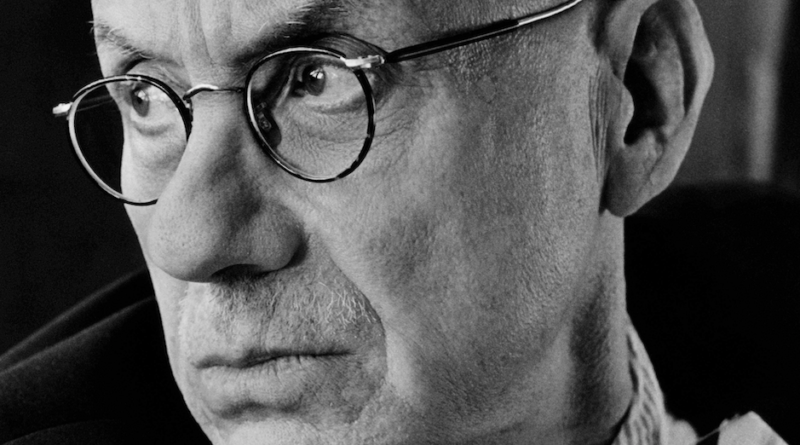INTERVIEW: James Ellroy and Los Angeles, old friends at it again
Photo: James Ellroy is the author of Widespread Panic. Photo courtesy of Marion Ettlinger / Provided by press rep with permission.
There’s no one quite like James Ellroy. The famed author and chronicler of mid-20th century Los Angeles history — well, at least artfully assembled and fabricated history — has taken his city of birth as his main muse for decades, pumping out noirish classics like L.A. Confidential, The Black Dahlia, White Jazz, The Big Nowhere, American Tabloid, The Cold Six Thousand and Blood’s a Rover. His more recent books, including the tantamount tomes of Perfidia and This Storm, continue his stylized prose and pull-no-punches investigations into the underbelly of crime, politics, Hollywood and society.
He’s a writer whose alliterative aphorisms and punchy, pithy dialogue take some getting used to, but once readers dedicate themselves to one of his books, there’s usually no turning back. A transformation occurs. The audience enters the sordid world of Ellroy fiction, one in which guilty consciences are never more than a few paragraphs away.
If the general public only knows Ellroy thanks to the cinematic adaptation of L.A. Confidential, the Oscar-winning movie directed by the late Curtis Hanson, then they don’t know Ellroy. His books are far more complex and convoluted than any single film can create. His treatises often run north of 500 pages, involve a trio of protagonists and a bountiful crew of supporting characters, feature intricately drawn directional renderings of L.A. neighborhoods (turn left on this avenue, turn right on this boulevard), and offer alternative headlines on well-known figures of the 20th century. John F. Kennedy is a frequent presence, most notably in his Underworld U.S.A. Trilogy (American Tabloid, The Cold Six Thousand and Blood’s a Rover). Police officers and detectives populate his brutal and brilliant L.A. Quartet (consisting of the interconnected and simultaneously stand-alone novels The Black Dahlia, The Big Nowhere, L.A. Confidential and White Jazz), while the battling forces of communism and fascism get top billing in the first two parts of the Second L.A. Quartet (so far Perfidia and This Storm have been released, with two more on the horizon).
Ellroy is not solely a creature and creator of fiction. He put on his soul-filled sleuthing hat for My Dark Places, a deeply personal memoir about his own mother’s murder. He continued his ruminating about the women in his life in The Hilliker Curse; he offered some short stories in Hollywood Nocturnes; and he unleashed his short fiction and journalism in the collections Crime Wave and Destination Morgue!
Legions of fans have flocked to the mystery writer, who is typically, at least in the pre-COVID days, a hit on the tour circuit, amassing crowds made up of loyal followers and newbies willing to dip their toe into his boiling world of creative historicity. Because at its heart, that’s what Ellroy has mastered over a career soon entering its fifth decade: He casts his literary operas with morally questionable fictional creations, often cops or former cops and the women they love and obsess over, and he frames their cutthroat journeys on the boulevards of Los Angeles amidst a real-life historical background. There may be the investigation into the most notorious unsolved crime in Los Angeles history: the Black Dahlia killing. There may be the horrible treatment of Japanese-Americans in Southern California during World War II. There could be the trysts and betrayals of A-list (and sometimes B-list and C-list) celebrities who were the main subjects of gossip magazines like Confidential.
This last theme — the ins, outs and mechanics behind the gossip-mongering of the 1950s — is the subject of Ellroy’s latest novel, which serves as a bit of a departure for the scribe, in more ways than one. First off, he’s hitting the pause button on his epic Second L.A. Quartet. He has every inclination to finish the series, but in the interim, he’s offering serialized novellas of a character he could no longer keep on the fringes: Freddy Otash, a real-life person who was a former cop with the LAPD before he turned into a private detective. In Ellroy’s new book, Widespread Panic, out now from Knopf, Otash is a shakedown artist who bugs the apartments of movie actors and directors, keeping files on these Hollywood denizens for Confidential magazine. Along the way, he falls in and out of love with a few women, sleeps alongside a leopard owned by Liberace, runs afoul of Chief William H. Parker, befriends James Dean, and tries to infiltrate the sordid guerrilla filmmaking of a buzz-worthy new movie called Rebel Without a Cause.
Otash has floated around Ellroy’s prose before, most notably in a Byliner digital novella from a few years ago. That story, called Shakedown, has been revamped and serves as part I of Widespread Panic. It’s followed by two other parts, offering readers a full portrait of this dubious man and his under-the-table exploits.
“I was going to publish a book with Vintage trade paperback that would have two long pieces I wrote for Vanity Fair,” Ellroy said in a recent phone interview from his Denver home. “And then I realized I could revise Shakedown and write two other pieces, and it would be a novel, hence Widespread Panic.”
Perhaps the most significant change he made to Shakedown is that Ellroy took himself out of the narrative. In the Byliner original, he entered into a back and forth with Otash, further melding together the real world and the one he has created for the page. That original novella was a favor for a previous editor of his, and he liked the way it turned out — but he needed modifications to make it the opening passage in a book that runs more than 200 pages.
“I included myself as a character, and I was a mediating device between Freddy Otash and purgatory and the base narrative, which is an origin story,” he said. “It’s how this dipshit fool, f—head guy got from being a cop on LAPD from ’45 to ’53, and that was it. I left it hanging when he had consolidated his power … and then I took myself out of it, and scene by scene expanded the story or shaved it down.”
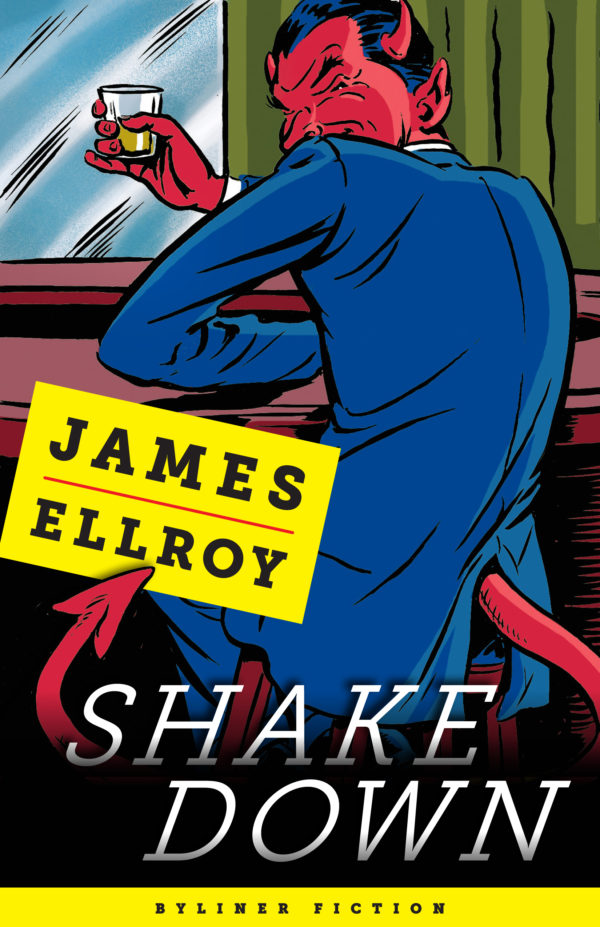
Otash was a real man, and Ellroy actually knew him in the last three years of the former cop’s life. They first met in 1989, and they would talk from time to time, until Otash died in October of 1992. Originally, the author wanted to make him the antihero of his earlier book, American Tabloid, which details the events leading up to the Kennedy assassination in November of 1963.
“He was a little leery about being a presidential assassin, even though I explained to him it’s fiction, and even though I gave him some money and would have given him much more money if he had actually appeared as the character,” Ellroy said. “One of my requirements was that he not contradict my book for attribution, and I didn’t trust him not to do that. He was supposed to remain mute on everything pertaining to the Kennedy hit as I portrayed him as one of the killers, but he temporized about this. He equivocated, and I realized, yeah, I can’t trust this guy. … Then Freddy died, and I could’ve used him as a character for free. But I had gone on at that point.”
For Widespread Panic, Ellroy focused on Otash’s years with Confidential magazine, a gossip publication that has been a frequent presence in the author’s books over the years. Along the way, Ellroy humanizes Otash as he documents his “crazy” and “immoral” actions. “I wouldn’t have done what he did, bugging people in bed together and then spilling the beans to Confidential,” he said. “No decent person would have done it, which doesn’t mean that post-mortem we can’t have a lot of fun reading about it or writing about it in my case.”
Ellroy, who was born in Los Angeles in the late-1940s, was too young to remember Confidential magazine during its heyday. He does recollect his father having some copies lying around the house; he read them and was titillated by the content, but at that time, Confidential was “just a shadow of their old, pernicious selves.”
Throughout Widespread Panic, like some of his other books, Ellroy adopts a hyper-alliterative style to his writing, a style he has developed over the years. Otash, in the novel, speaks in that voice, which resides near the catchy, adjective-heavy prose of Hollywood rags. Ellroy’s style is more economical and punchy. The author’s former wife and current girlfriend, writer Helen Knode, apparently told Ellroy that Widespread Panic is the most refined version of this unique voice.
Dean, the movie actor who met an untimely death, features prominently within these pages. He starts off as Otash’s friend, in the days before East of Eden and Giant. Then the actor hooks up with director Nicholas Ray, and the shooting of Rebel Without a Cause becomes a major plot point later in the novel. Ellroy does not count himself as a fan of the actor, and that’s perhaps why he gives him such an incredible arc in Widespread Panic.
“I hated James Dean,” Ellroy admitted. “I hate that movie. I thought James Dean was full of shit. I don’t think he could act to blow his nose. I hated Nicholas Ray. I felt nonplussed by Dennis Hopper, which is why he is portrayed sympathetically in the book. I couldn’t stand Nick Adams. I didn’t like Sal Mineo, and I had a great deal of fun maligning those people in this piece. [spoiler alert] One of my favorite parts of the piece is in one of the transitional chapters in Gonesville, part III of the novel, where Freddy is updating events from ’55 after the wrap of Rebel Without a Cause to ’57, the Confidential trial, and Freddy writes: ‘Jimmy Dean went tits-up in a car wreck. Tuff shit. His mopey martyrdom moves millions and redefines Confidential’s concept of epic boo-hoo.’ It was great to write those lines.”
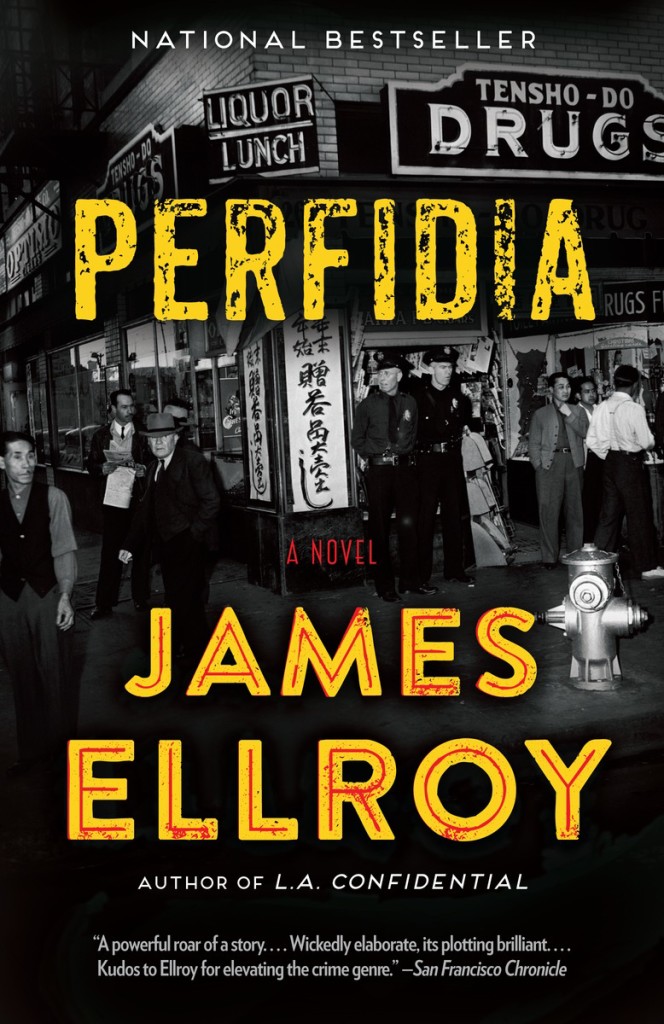
For Ellroy’s literary explorations, he only sticks to people who are deceased. He’s a man who lives in the past anyway, so it only feels appropriate that the real characters in his fictionalized books should be gone from this world, if not society’s collective memory. He even admitted, with a laugh, that when one day he and this reporter go, “we’re fair game.”
Each of the novellas in Widespread Panic features a different woman who enters the narrative and has some type of relationship with Otash. After talking with Ellroy, it feels like his favorite of the trio is Lois Nettleton, a real-life actor who died in 2008 and appears in part III, Gonesville.
“She was an astonishing crush of mine way back when,” Ellroy said. “I saw her, Nettleton, the first time in a series of episodes in the Naked City TV show, circa ’61, ’62, ’63, and she ripped my heart out. … I’ve only seen her eight times perhaps, four episodes of Naked City first of all and then four episodes of The Fugitive when I was older. I was further into my adolescence at this point, and I had it bad for her. As a mature adult I went back and found box sets of The Fugitive and of Naked City and looked at Lois in these performances, and she is the very prototype of the lonely, haunted woman, the archetype for me. These women that appear in all my novels, it started with Lois. As much as an older person like me can look back over their life and say, OK, well, I got this here, I got this there — well, it’s my belief that this key figure in the books that I write derives from yours truly age 13 seeing her in Naked City.”
He added: “She passed in ’08. Lived to 80 though — 80 ain’t bad. I wrote her a letter once. I did a piece for Movieline magazine. The editor Virginia Campbell there was a friend of mine, and I wrote about The Fugitive and the women in The Fugitive and the sexual dynamic of The Fugitive. … Richard Kimble, portrayed by David Janssen, the doctor falsely accused of murdering his wife, is on the run from pissed-off Lt. Gerard, and wherever he goes, whatever city he goes to, the swingingest, grooviest, most independent, most hard-charging woman in the town finds him, and they fall in love. And they have a moment of truth, and they kiss a couple of times. But he’s got to get the hell out of Dodge. And Sandy Dennis, Elizabeth Allen, Diana Van Der Vlis, Suzanne Pleshette, June Harding, but most notably Lois Nettelton. She circumscribes her own archetype. She is the lonely, haunted woman. She is desperate for love, romance, companionship, rapport, sex, all of it, and it’s astonishing to see the sameness of these performances in how nakedly real and devoid of ego she is in them. So I featured her in this piece that I wrote for Movieline years ago, and then I got her address in Movieline, and I sent her some flowers. And she sent me a nice note back, and that was it. I never saw her in person. I send flowers to her grave a couple times a year.”
Another female character in the book goes by the nickname Stretch. She serves as one of Otash’s only friends in the novel. They platonically share a bed, along with Liberace’s leopard (long story). Stretch is an athlete who first is noticed by Otash because of her height, and there’s actually a real person Ellroy based her on — though he doesn’t know her true identity.
“The relationship with Stretch is sweet,” the writer said. “He’s going out to Linda’s Little Log Cabin, the venerable lesbian bar that’s been in my books, and I actually used to go there in the late-’60s. And Linda’s Little Log Cabin is way the hell out Ventura Boulevard, like maybe Encino or Sherman Oaks, if you know that part of the Valley. … I had a friend, and may he rest in peace, he died in a plane crash when he was very young. … We’d be just bombing around, up to no good, and sometimes we heard about Linda’s Little Log Cabin. Oooh, this is seductive, lesbian bar, and we were the only two men in the place. And for whatever reason we used to wear Levi cords probably because it’s what square white guys like us wore back then. We’d go in, and we’d have a navy blue nylon windbreaker on and these cords, and we were big tall guys. They thought we were the Alcohol and Beverage Control, young guys, dark hair, mustache, the threads that I just described to you, so they’d bullshit with us and give us free beer and stuff like that.”
He added: “So Linda’s Little Log Cabin occurs and recurs in my books, and then here’s Freddy going out there for the rendezvous with the sexually conflicted 6’-6” college basketball player. And he’s very sweet with women, Freddy. Whatever his travails and problems in this lifetime, and his penchant for brutality and everything else, he’s soft-hearted as far as women are concerned. … [The] character is influenced by a woman I saw in a bookstore in Westwood in 1978 when I was 30 and caddying at Bel-Air Golf Club. I’d walk through Westwood Village. I had a crummy hotel room on Westwood Boulevard, south of Santa Monica on the east side of the street — Westwood Hotel, $21 bucks a week — and I was looking for a book to read in a small independent bookstore on Weyburn or Broxton or one of those streets. And there was this blond woman, maybe a few years younger than me. I swear she was 6’-7”, and I was daunted. I had never seen a woman before who was taller than me, and I was daunted by her. And I was in love, and I was afraid to approach her. And I never did. I mean, I didn’t that day, and I never saw her again. Over the years, I thought about trying to look her up, put an ad in: ‘Hi, I’m looking for the 6’-7” blond woman I saw at the bookstore in Westwood in ’78, boom boom boom. I was a shithead kid then and a caddy at Bel-Air Country Club, but now I’m a famous writer. Let’s get together.’ It just seemed like a lodestone to attract all kinds of psycho women, so I didn’t do it.”
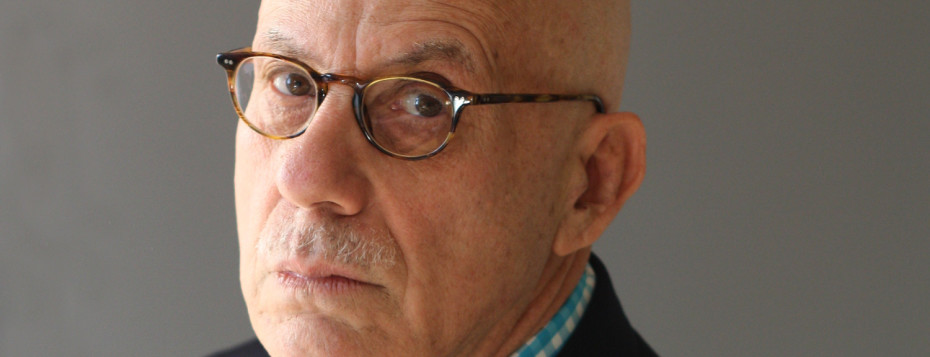
Ellroy was quick to point out that Widespread Panic features “tall tales” about Otash and his contemporaries. He classifies them as mediations on the slightly ridiculous, on-the-prowl male figure of mid-century America. Otash, as a fictional creation, hovers around brutality, ruthlessness, sentimentality, self-pity and greed.
“He embodies all of the seven deadly sins,” he said. “He’s a tawdry cat, and I give him a fluttering soul and a huge sense of guilt. It’s very much a Christian novel. Freddy is poised always between sin and repentance. There are only these two moral extremes in Freddy Otash’s world.”
His exploration of Otash as a character has been a fulfilling one, so much so that Ellroy’s next book will be a sequel to Widespread Panic. That will come first, followed by the two concluding novels in the Second L.A. Quartet. No matter the book he’s working on, it’s a safe bet that old-time Los Angeles will be the backdrop to the sordid tale being told. Ellroy’s impeccable memory of his time in the city drives his narrative thrust, supplying him with vital information on the neighborhoods and neighbors of the metropolitan area, circa 60-70 years ago.
“It’s a fixation, and it’s a very grand one,” he said. “I have an astonishing memory, and I live in the past. And that’s no shit. I don’t have a computer. I’ve never used one. I don’t have a cellphone. I don’t have an Instagram account. I don’t have tweets or Twitter or any of that stuff. I’m talking to you on a landline phone. I don’t know how to text on a telephone. If I want to buy a pair of shoes or something on the internet, well, Helen operates it for me. I don’t know how to turn on Helen’s TV it’s so complex, so none of that rules my life. It’s all non-digital. … I’ll watch any crummy old L.A-based crime movie and sit through it just to see some L.A. locations. The books that I read — the novels, the true-crime books — all detail the past.”
Ellroy has gained perspective while he lives away from the city of his muse. The last time he lived in Los Angeles, he was keeping company in Bronson Canyon, but he prefers Denver now. “It’s a very neutral place, Denver, Colorado,” he said. “Physically it’s a good-looking place. I like cold weather. It’s colder a lot more than it’s hot here, and it’s a good deal with Helen that I have because we have two separate pads on the same floor, two lofts. So both of us we can shuttle back and forth and be together or not, as is our want, so it’s quiet here, and I like that. Bronson Canyon was a pain in the ass. There were always big old trucks coming up and down, FedEx, noise, sirens, helicopters overhead, LAPD most of all, and it was L.A. — too big, too smoggy, too crowded, too many people, too many cars.”
Once COVID is gonesville, Ellroy will get back to Los Angeles for a weekend of hitting up old friends. He said he still has pals on the LAPD, but his favorite restaurant, the Pacific Dining Car, went bust during the pandemic. Still, there’s enough he can enjoy in town for at least a few days. “We can go to these square-ass old restaurants,” he said. “Stay in a hotel, look around. Hey, L.A, I know you. We’re old friends.”
By John Soltes / Publisher / John@HollywoodSoapbox.com
Widespread Panic by James Ellroy is now available from Knopf. The author has two virtual events scheduled. On Tuesday, June 15, at 6 p.m. EST, Ellroy will take part in a Q&A with Tom Wickersham on the Facebook and YouTube pages of New York City’s Mysterious Bookshop. Then, on June 22, at 5 p.m. PDT (8 p.m. EST), the author will be a guest on a virtual panel hosted by Chevalier’s Books and Writers Bloc in Los Angeles.
